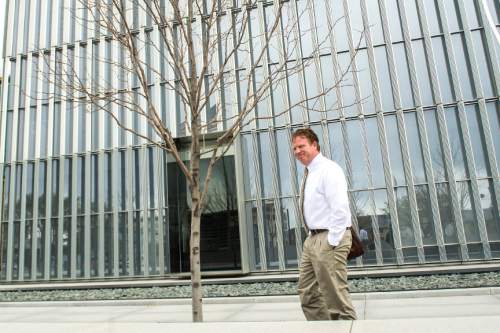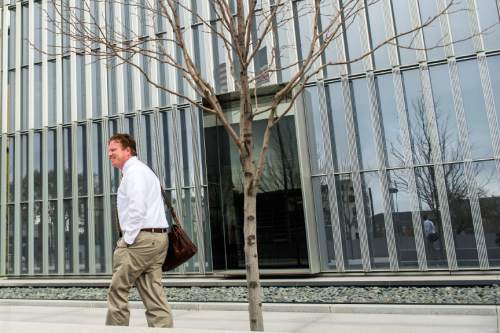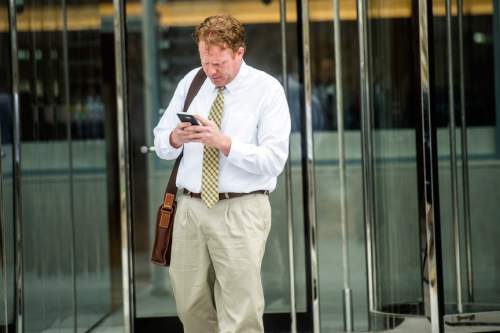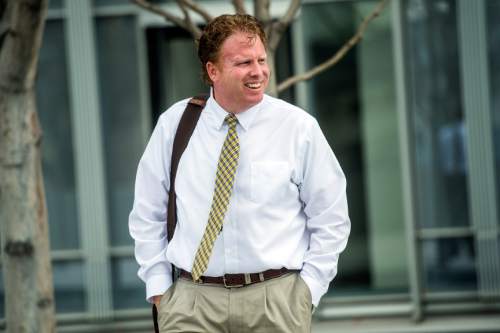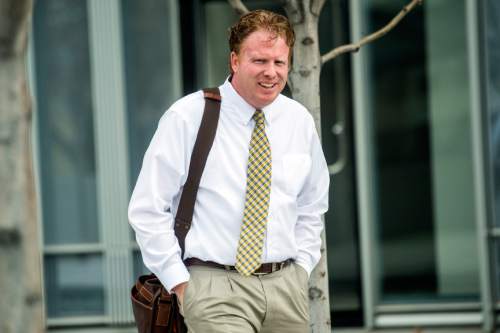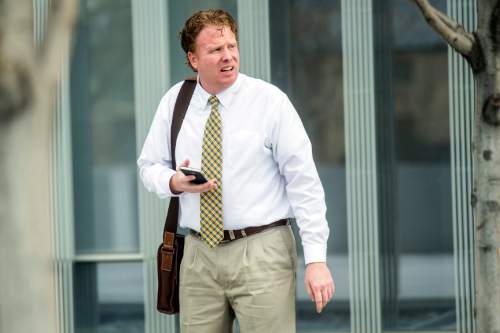This is an archived article that was published on sltrib.com in 2015, and information in the article may be outdated. It is provided only for personal research purposes and may not be reprinted.
It was a motion about a judge's order that hadn't been issued and would not be — so indicted St. George businessman Jeremy Johnson was home for Thanksgiving and not in jail.
And if that's not confusing enough, the case against Johnson and three other top employees of his online marketing company is becoming even more convoluted with the sudden appearance of recordings, instant messages and perhaps a million new documents that showed up as possible evidence, even as the bank fraud case rushes toward a February trial.
Johnson might have been on the path to turkey and the trimmings in jail after U.S. Magistrate Judge Paul Warner issued an order on Tuesday that found the motions Johnson had filed himself — and not through his attorneys — were an attempt to circumvent a gag order issued two years ago to all participants in the criminal case.
"Even if they are not such an attempt," Warner wrote, "the court concludes that defendant's [self-filed] motions constitute a violation of the gag order."
Then, at a Wednesday morning hearing called to discuss other matters, Warner said Johnson had filed two new motions, one asking to be allowed to represent himself and one opposing an order that he be sent to jail for violation of the gag order.
Warner responded to Johnson's latest motions by saying his Tuesday order had found only a possible intent to violate the gag order and pointed out that he had not issued one sending Johnson to jail. He declared Johnson's latest motions moot.
"I guess the answer is, you'll be going home for Thanksgiving," Warner told Johnson, while ordering that any future motions the defendant filed by himself would be sealed and, apparently, not considered by the court.
With that issue disposed of, the hearing turned toward issues that have roiled the case recently, particularly waves of emails that defense attorneys say are missing from copies of computer hard drives from Johnson's I Works company. They also pointed to the recent discovery of recordings and instant messages from the company's computers that had not been included on earlier evidence disclosures by prosecutors.
Johnson and the other three defendants face 86 charges related to allegations of bank fraud involving accounts they set up to process payments from customers who bought their online products. A trial is set to begin Feb. 1.
But defense attorneys recently have raised the issue of up to two years of I Works emails missing from the company's computers after they were seized when federal regulators sued Johnson and I Works alleging they defrauded consumers. The computer hard drives have been stored in Las Vegas, where the civil lawsuit was filed, and the court-appointed I Works receiver had provided copies of some of them to federal prosecutors in Utah, who also turned them over to defense attorneys.
Assistant U.S. Attorney Robert Lunnen said an FBI electronic evidence expert recently sent to Las Vegas had made a new copy of an I Works computer server on which was found backups from other computers used by employees, including Johnson's. Lunnen said he wanted defense attorneys to agree what method to now use to go back to the computer hard drives and try to recover the missing emails.
"There's no guarantee of the restoration of any emails," Lunnen added.
All the emails from the four defendants and at least two witnesses are missing from a critical period of about 2007 to 2010, defense attorneys have said in court documents. Johnson in a filing in the civil lawsuit in Nevada claimed the receiver may have scrubbed the emails from previous copies of the I Works computer hard drive, while the receiver has said all emails were provided on three occasions.
Lunnen also said defense attorneys now have all the evidence that the prosecution intends to use at trial. Steven Killpack, an attorney for defendant Ryan Riddle, said Lunnen missed the point.
"An email has to have some context," Killpack said, "the give and take of what it is responding to."
Marcus Mumford, an attorney for defendant Scott Leavitt, has a motion pending that seeks a hearing about the missing emails. He tried Wednesday to ensure that issue is not forgotten.
"I'm not looking to create an issue," Mumford said. "I'm looking to make sure the jury has the facts, the whole facts and not the government's portion of what they say is the truth."
Lunnen, however, said the defense was engaged in a "fishing expedition."
Warner asked defense attorneys to come to an agreement on what method they would accept to conduct a new search of the computer hard drive to try to find the missing emails.
But defense attorneys also said the late evidence found by the FBI on a computer hard drive presented new challenges.
Ed Wall, an attorney for defendant Bryce Payne, said he was told by the defense's electronic expert that about 1 million new documents had been found.
"That creates a substantial issue in this case," Wall said. "The defense now has 1 million more documents it has to go through."
Warner said that electronic searches would allow the defense to do quick searches, and he reacted angrily when defense attorney David Finlayson referred to the "huge staff" that the U.S. attorney's office has to go through evidence as opposed to defense lawyers.
Warner said adequate resources were always a problem when he served as U.S. attorney and that he has offered to provide resources so the defense could hire the help it needs.
"So don't start with me that they have a huge staff and you don't have any help," said an agitated Warner.
Johnson's attorney Rebecca Skordas also pointed out that the new evidence contains voice recordings and instant messages that can't be electronically searched for keywords.


